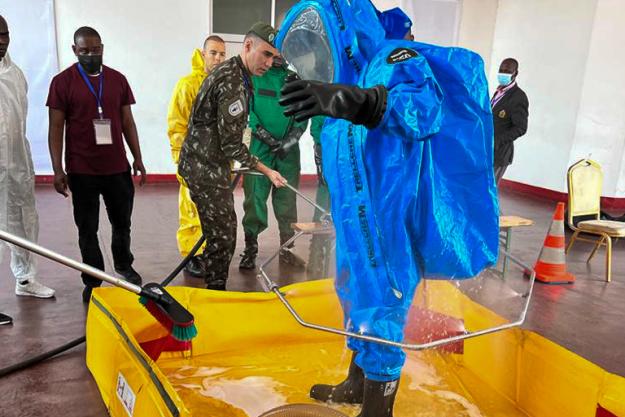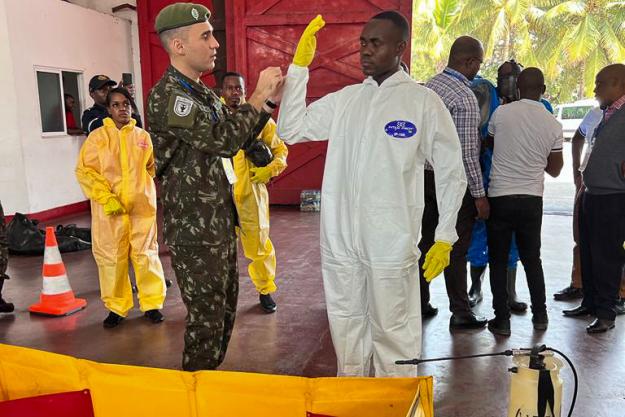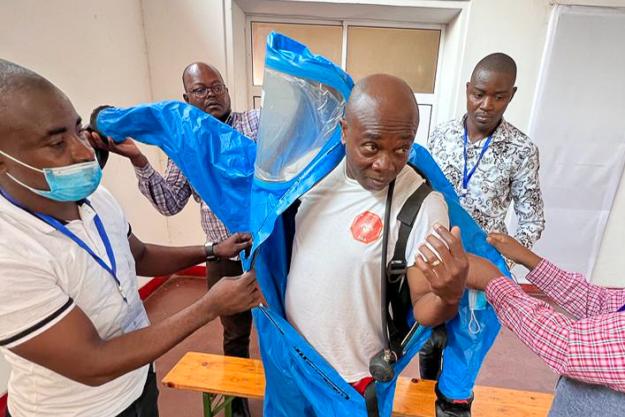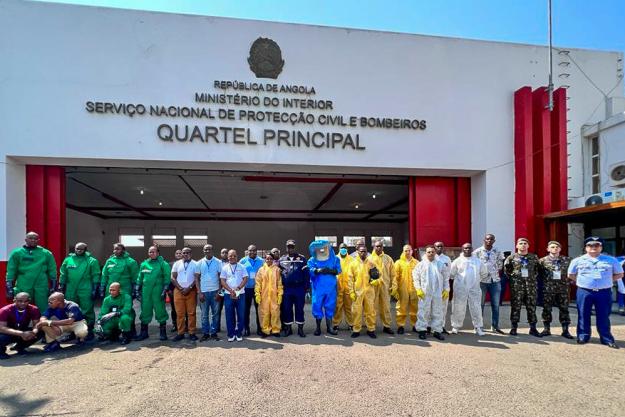
Instructor demonstrates decontamination of first responder in level-A personal protective gear (PPE).
Decontamination solution is sprayed using 360 degree coverage.
THE HAGUE, Netherlands—20 July 2022—The first phase of a three-part training cycle that builds preparedness for and stronger resilience to chemical emergencies for Portuguese-speaking countries concluded earlier this month.
The Assistance and Protection Training Cycle organised for Portuguese-speaking Member States of the Organisation for the Prohibition of Chemical Weapons (OPCW) kicked off with a Basic Course on Emergency Response to Chemical Incidents which took place from 27 June to 1 July 2022 in Luanda, Angola. The course was hosted and co-organised by the Government of the Republic of Angola.
The course enhanced the capabilities of participating Member States to manage a chemical emergency within their borders. It covered theoretical knowledge and practical hands-on training related to the use of protective equipment, the effects and characteristics of chemical warfare agents, chemical detection and identification, and establishing the incident command and control system, an approach to coordinating incident responses from multiple agencies.

Participant outfitted in protective gear to work at decontamination station.
To limit exposure, the suit must seal over the top of the gloves.
Participants also exchanged knowledge and national experience related to the implementation of Article X of the Chemical Weapons Convention (CWC) which focuses on assistance and protection measures in chemical emergencies.
The Advanced Course and Exercise Courses, the two remaining phases of the Training Cycle, will take place in Portugal and Brazil before the end of 2023.
In his opening statement, H.E. Admiral José Maria de Lima, Deputy Minister of Defence and Secretary of State for National Defence of Angola, emphasised that disarmament and non-proliferation of weapons of mass destruction are unavoidable issues on the international agenda. He further reiterated Angola’s deep commitment to peace and regional and international security.

Participant practices donning level-A personal protective equipment.
The OPCW Programme Officer who organised the event stressed that the Organisation places considerable importance on boosting the capacity of its Member States to tackle incidents involving chemical warfare agents and toxic industrial chemicals. “This course will bolster the network of Portuguese-speaking chemical emergency response experts and increase the capacities of these Member States to respond to chemical incidents,” he underlined.
Twenty-five participants from six OPCW Member States attended the course: Angola, Brazil, Cabo Verde, Guinea-Bissau, Mozambique, and Portugal.

Course participants and instructors from Angola, Brazil, Cape Verde, Guinee Bissau, Mozambique, and Portugal.
Background
Over 99% of all declared chemical weapon stockpiles have been destroyed under OPCW verification. For its extensive efforts in eliminating chemical weapons, the OPCW received the 2013 Nobel Peace Prize.
